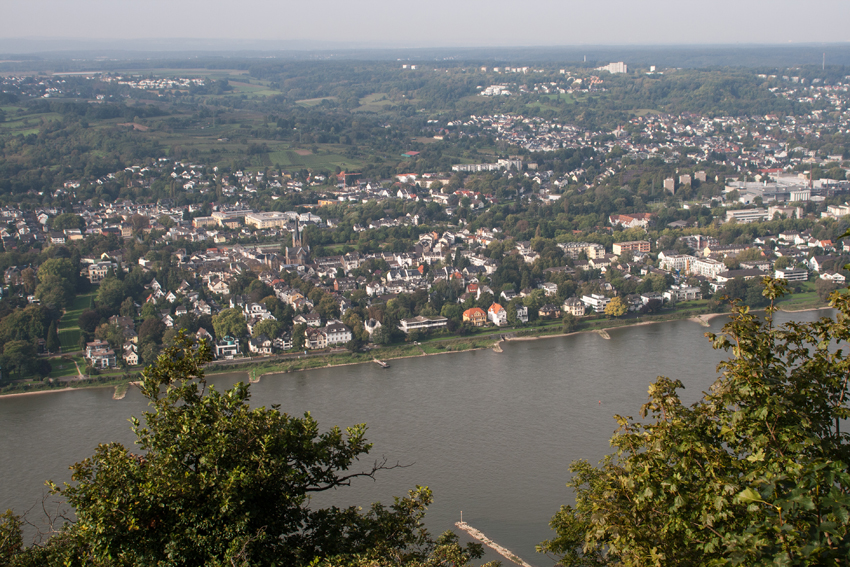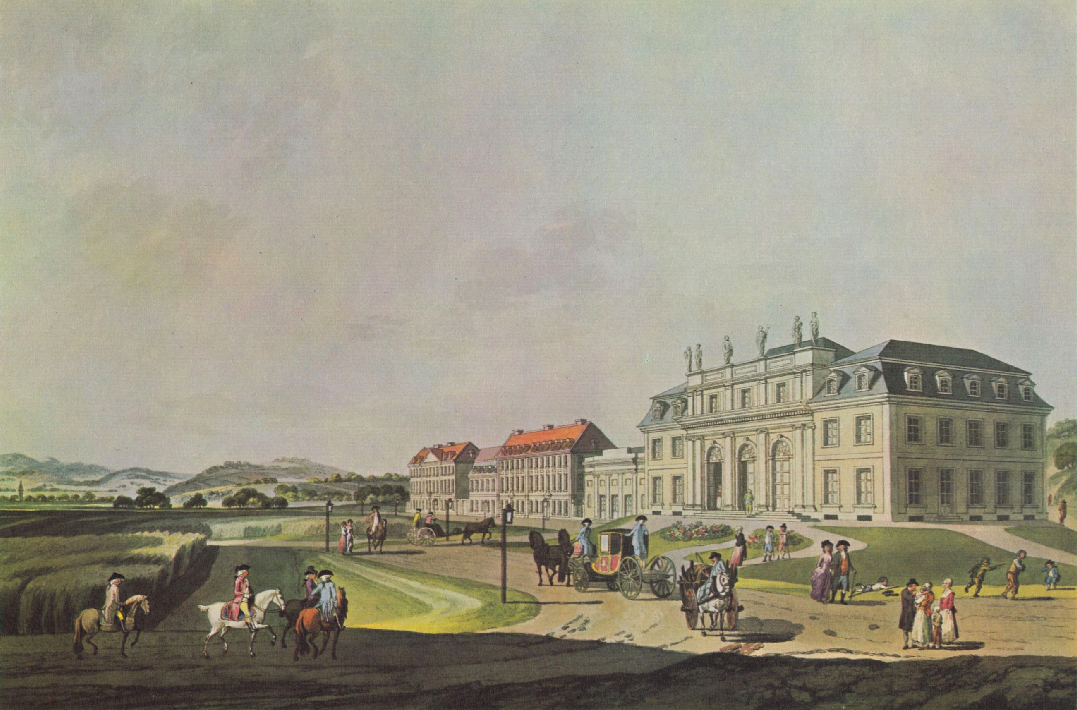|
Godesberg
Bad Godesberg ( ksh, Bad Jodesbersch) is a borough (''Stadtbezirk'') of Bonn, southern North Rhine-Westphalia, Germany. From 1949 to 1999, while Bonn was the capital of West Germany, most foreign embassies were in Bad Godesberg. Some buildings are still used as branch offices or consulates. Geography Bad Godesberg is located along the hills and cliffs of the west bank of the Rhine river, in west central Germany. Godesberg is also the name of the steep hill, of volcanic origin, on the top of which are the ruins of the Godesburg, a castle destroyed in 1583 during the Cologne War. History The following events occurred, per year: * 722 - First official record of the town, which was named after a nearby mountain, the Woudenesberg (later Godesberg), a basalt cone where the Ubii, a Germanic tribe, worshipped the god Wotan. * 1210 - On 15 October, Archbishop of Cologne Dietrich I lays the foundation stone of the Godesburg fortress on the Godesberg mountain. * 1583 - On 17 Decembe ... [...More Info...] [...Related Items...] OR: [Wikipedia] [Google] [Baidu] |
Siege Of Godesberg
The siege of Godesberg, 18 November – 17 December 1583, was the first major siege of the Cologne War (1583–1589). Seeking to wrest control of an important fortification, Bavarian and mercenary soldiers surrounded the Godesberg, and the village then of the same name, now Bad Godesberg, located at its foot. On top of the mountain sat a formidable fortress, similarly named Godesburg, built in the early 13th century during a contest over the election of two competing archbishops. Towering over the Rhine valley, the Godesburg's strategic position commanded the roads leading to and from Bonn, the Elector of Cologne's capital city, and Cologne, the region's economic powerhouse. Over time, the Electors strengthened its walls and heightened its towers. They added a small residence in the 14th century and the ''donjon'' (also called a ''Bergfried'' or keep) developed as a stronghold of the Electoral archives and valuables. By the mid-16th century, the Godesburg was considered nearly i ... [...More Info...] [...Related Items...] OR: [Wikipedia] [Google] [Baidu] |
Godesberg Program
The Godesberg Program (german: Godesberger Programm) of the Social Democratic Party of Germany (SPD) was ratified in 1959 at a convention in the town of Bad Godesberg near Bonn. It represented a fundamental change in the orientation and goals of the SPD, rejecting the aim of replacing capitalism while adopting a commitment to reform capitalism and a mass party orientation that appealed to ethical rather than class-based considerations. It also rejected nationalization as a major principle of socialism. Overview The Godesberg Program eliminated the party's remaining orthodox Marxist policies and the SPD redefined its ideology as ''freiheitlicher Sozialismus'' (liberal socialism). With the adoption of the Godesberg Program, it renounced orthodox Marxist class conflict and economic determinism. The SPD replaced it with an ethical socialism based on humanism and emphasized that it was democratic, pragmatic and reformist. The most controversial decision of the Godesberg Program wa ... [...More Info...] [...Related Items...] OR: [Wikipedia] [Google] [Baidu] |
Bonn
The federal city of Bonn ( lat, Bonna) is a city on the banks of the Rhine in the German state of North Rhine-Westphalia, with a population of over 300,000. About south-southeast of Cologne, Bonn is in the southernmost part of the Rhine-Ruhr region, Germany's largest metropolitan area, with over 11 million inhabitants. It is a university city and the birthplace of Ludwig van Beethoven. Founded in the 1st century BC as a Roman settlement in the province Germania Inferior, Bonn is one of Germany's oldest cities. It was the capital city of the Electorate of Cologne from 1597 to 1794, and residence of the Archbishops and Prince-electors of Cologne. From 1949 to 1990, Bonn was the capital of West Germany, and Germany's present constitution, the Basic Law, was declared in the city in 1949. The era when Bonn served as the capital of West Germany is referred to by historians as the Bonn Republic. From 1990 to 1999, Bonn served as the seat of government – but no longer capi ... [...More Info...] [...Related Items...] OR: [Wikipedia] [Google] [Baidu] |
Redoute, Bad Godesberg
The Redoute in Bad Godesberg, now part of Bonn, North Rhine-Westphalia, Germany, is a hall opened in 1792 for balls of the court of Archduke Maximilian Francis of Austria. When Bonn was the location of the government of the Federal Republic of Germany, from 1949 to 1990, state receptions were held at the Redoute. Today, the listed historical building is used for events. History When the spring water in Godesberg was found to be of spa quality, Archduke Maximilian Francis of Austria developed the town as a spa. The Redoute was built in Neoclassical style from 1790, designed by . It was planned to be used for balls and other entertainment of the court and spa visitors. It was opened in 1792, and was a venue for balls, games, performances of plays, opera, ballet and concerts of the court orchestra, with Ludwig van Beethoven as a violinist and violist. In 1792, Beethoven played for Joseph Haydn, and they planned there that Beethoven would visit Vienna again to become a master student ... [...More Info...] [...Related Items...] OR: [Wikipedia] [Google] [Baidu] |
Godesberg Memorandum
The Godesberg Memorandum is a document issued by Adolf Hitler in the early hours of 24 September 1938 concerning the Sudetenland and amounting to an ultimatum addressed to the government of Czechoslovakia. It was named after Bad Godesberg, where Hitler had met Neville Chamberlain for long talks on 23 September continuing into the next day. Background At the time of the collapse of the Austro-Hungarian Empire, the Sudetenland was a German-speaking part of the Empire which fell to the new state of Czechoslovakia, itself dominated by the Czechs. Initially, many Sudeten Germans wished to become part of the new German-speaking state of German Austria, and later they hoped to join Austria. However, the Treaty of Saint-Germain of 1919 confirmed the inclusion of the German-speaking territories within Czechoslovakia. By the beginning of 1938 most Sudetens aspired to be integrated into Nazi Germany, which was fast advancing in economic success and international prestige. Following an ... [...More Info...] [...Related Items...] OR: [Wikipedia] [Google] [Baidu] |
Godesburg
300px, Godesburg castle in Germany. The Godesburg is a castle in Bad Godesberg, a formerly independent part of Bonn, Germany. Built in the early 13th century on the Godesberg, a hill of volcanic origin, it was largely destroyed following a siege in 1583 at the start of the Cologne War. In 1891, the German emperor Wilhelm II donated the castle's ruin to the city of Bad Godesberg. In 1959, the ruin was rebuilt according to plans by Gottfried Böhm, to house a hotel and restaurant. Today, the restaurant is still in operation, but the hotel tract has been divided into apartments. Location The site has a controversial history. Growing out of the nineteenth-century '' Heimat'' movement, historians speculated that in the pre-Christian era, the inhabitants probably used the peak to call to the god '' Wotan'', the god of war, death and the hunt, and other attributes, establishing a custom that led eventually to the erection of a house of prayer on the site. They found early mention ... [...More Info...] [...Related Items...] OR: [Wikipedia] [Google] [Baidu] |
Cologne War
The Cologne War (german: Kölner Krieg, Kölnischer Krieg, Truchsessischer Krieg; 1583–88) was a conflict between Protestant and Catholic factions that devastated the Electorate of Cologne, a historical ecclesiastical principality of the Holy Roman Empire, within present-day North Rhine-Westphalia, in Germany. The war occurred within the context of the Protestant Reformation in Germany and the subsequent Counter-Reformation, and concurrently with the Dutch Revolt and the French Wars of Religion. Also called the Seneschal's War () or the Seneschal Upheaval () and occasionally the Sewer War, the conflict tested the principle of ecclesiastical reservation, which had been included in the religious Peace of Augsburg (1555). This principle excluded, or "reserved", the ecclesiastical territories of the Holy Roman Empire from the application of '' cuius regio, eius religio'', or "whose rule, his religion", as the primary means of determining the religion of a territory. It stipula ... [...More Info...] [...Related Items...] OR: [Wikipedia] [Google] [Baidu] |
Social Democratic Party Of Germany
The Social Democratic Party of Germany (german: Sozialdemokratische Partei Deutschlands, ; SPD, ) is a centre-left social democratic political party in Germany. It is one of the major parties of contemporary Germany. Saskia Esken has been the party's leader since the 2019 leadership election together with Lars Klingbeil, who joined her in December 2021. After Olaf Scholz was elected chancellor in 2021 the SPD became the leading party of the federal government, which the SPD formed with the Greens and the Free Democratic Party, after the 2021 federal election. The SPD is a member of 11 of the 16 German state governments and is a leading partner in seven of them. The SPD was established in 1863. It was one of the earliest Marxist-influenced parties in the world. From the 1890s through the early 20th century, the SPD was Europe's largest Marxist party, and the most popular political party in Germany. During the First World War, the party split between a pro-war mainstream ... [...More Info...] [...Related Items...] OR: [Wikipedia] [Google] [Baidu] |
Neville Chamberlain
Arthur Neville Chamberlain (; 18 March 18699 November 1940) was a British politician of the Conservative Party who served as Prime Minister of the United Kingdom from May 1937 to May 1940. He is best known for his foreign policy of appeasement, and in particular for his signing of the Munich Agreement on 30 September 1938, ceding the German-speaking Sudetenland region of Czechoslovakia to Nazi Germany led by Adolf Hitler. Following the German invasion of Poland on 1 September 1939, which marked the beginning of the Second World War, Chamberlain announced the declaration of war on Germany two days later and led the United Kingdom through the first eight months of the war until his resignation as prime minister on 10 May 1940. After working in business and local government, and after a short spell as Director of National Service in 1916 and 1917, Chamberlain followed his father Joseph Chamberlain and elder half-brother Austen Chamberlain in becoming a Member of Parliame ... [...More Info...] [...Related Items...] OR: [Wikipedia] [Google] [Baidu] |
Gebhard Truchsess Von Waldburg
Gebhard Truchsess von Waldburg (10 November 1547 – 31 May 1601) was Archbishop-Elector of Cologne. After pursuing an ecclesiastical career, he won a close election in the cathedral chapter of Cologne over Ernst of Bavaria. After his election, he fell in love with and later married Agnes von Mansfeld-Eisleben, a Protestant Canoness at the Abbey of Gerresheim. His conversion to Calvinism and announcement of religious parity in the Electorate triggered the Cologne War. On 19 December 1582, a proclamation in his name established parity for Catholics and Calvinists in the Electorate of Cologne, causing a scandal in the Roman Catholic Church and the Holy Roman Empire, and after his marriage in February 1583, he sought to convert the Electorate into a dynastic dignity. For the next six years, his supporters fought those of the Roman Catholic dominated cathedral chapter for the right to hold the electorship and the archdiocese in the so-called Cologne War or Seneschal War. Af ... [...More Info...] [...Related Items...] OR: [Wikipedia] [Google] [Baidu] |



.jpg)

